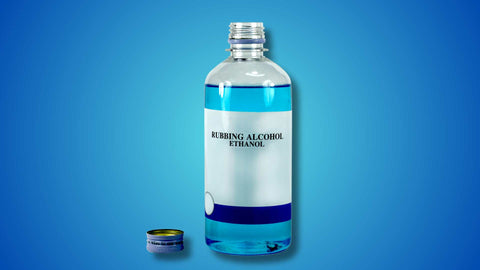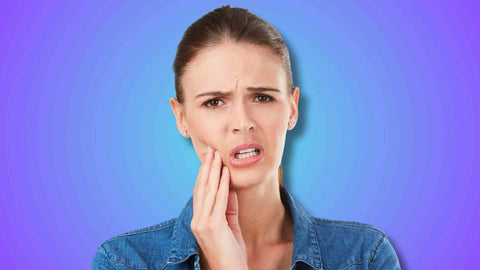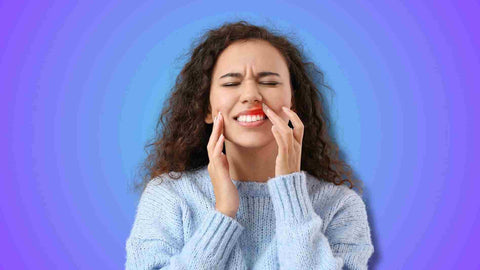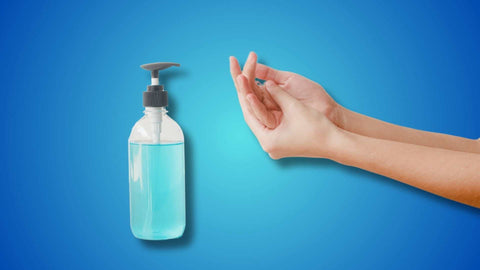Can You Rinse Your Mouth with Rubbing Alcohol?
No, you should not rinse your mouth with rubbing alcohol. While rubbing alcohol is effective as a surface disinfectant and antiseptic for external use, it is not safe for ingestion or internal use, including rinsing inside the mouth.
Rubbing alcohol can cause irritation and chemical burns to the delicate tissues of the oral cavity. Further, if you accidentally swallow it, it can lead to serious health issues, including poisoning and systemic toxicity.
For oral hygiene and mouth rinses, it's much safer and more appropriate to use products specifically designed for oral care. These include herbal mouthwashes that contain ingredients safe for use in the mouth, which can help reduce bacteria, freshen breath, and in some cases, offer additional benefits like fluoride for cavity prevention.
If you're looking for a homemade alternative, a saltwater rinse can be a gentle and effective option for soothing minor mouth irritations.
In this article, I'll explain everything you need to know about rubbing alcohol and its effects on your oral health.
What is rubbing alcohol?

Rubbing alcohol, also known as isopropyl alcohol, is a chemical compound used for its disinfecting and cleaning properties.
It's commonly found in household and medical settings for sanitizing surfaces, sterilizing medical instruments, and as an antiseptic for minor cuts and scrapes. Rubbing alcohol is effective against many types of bacteria, viruses, and fungi, making it a versatile cleaning agent.
In terms of oral care, some people use rubbing alcohol as a homemade remedy to disinfect oral wounds or treat minor mouth infections due to its antibacterial properties.
However, it's important to exercise caution. Rubbing alcohol is not intended for ingestion and can be toxic if swallowed. Its use inside our mouths should be limited and done with care, ideally under the guidance of a healthcare professional, if at all.
For oral health issues, there are safer and more appropriate products available, such as herbal mouthwashes specifically designed for oral use, which contain ingredients that are safe and effective for treating oral conditions without the risks associated with rubbing alcohol.
Should I use rubbing alcohol as mouthwash?

No, you should not use rubbing alcohol as a mouthwash. Rubbing alcohol, or isopropyl alcohol, is not intended for oral use and can be harmful if ingested.
It is designed for external use only, such as for disinfecting surfaces or sterilizing skin before injections. Using rubbing alcohol as a mouthwash can lead to several health risks, such as toxicity, irritation, and even chemical burns.
For maintaining oral hygiene and health, it's much safer and more effective to use products specifically designed for oral care, such as nano hydroxyapatite toothpaste and alcohol free mouthwashes that are formulated to be safe for use in the mouth.
These products can help clean your teeth, freshen your breath, and reduce the risk of oral diseases without the dangers associated with using rubbing alcohol.
Side Effects of Using Rubbing Alcohol as Mouthwash

While rubbing alcohol is effective for cleaning surfaces and sterilizing minor cuts and scrapes, using it as a mouth rinse is not a good idea.
The oral cavity is a sensitive area, and substances used within it require careful consideration due to the potential for ingestion and mucosal irritation.
Despite its germ-killing capabilities, rubbing alcohol's side effects significantly outweigh its benefits when it comes to oral use.
Toxicity
One of the primary concerns with using rubbing alcohol for oral care is its toxicity. Isopropyl alcohol is not safe for ingestion, and even small amounts can be poisonous.
Sure, rubbing alcohol might kill bacteria, but it can also have serious consequences for your oral health.
When used inside the mouth, there's a high risk of accidentally swallowing some, which can lead to symptoms like vomiting, abdominal pain, dizziness, and in severe cases, respiratory depression or coma.
Also, the human body metabolizes isopropyl alcohol into acetone, further increasing the toxicity and potential for harm, making it a risky choice for oral hygiene.
Irritation
Additionally, rubbing alcohol can cause significant irritation to the mucous membranes inside the mouth.
Its drying effect can strip away the mouth's natural protective barriers, leading to dryness, discomfort, and an imbalance in the oral microbiome.
This disruption can make your mouth more susceptible to infections and inflammation, counteracting any potential benefits of its antibacterial action.
The irritation can also exacerbate existing oral health issues, such as gum disease or mouth ulcers, leading to increased discomfort and prolonged healing times.
Chemical Burns
Moreover, the concentrated nature of rubbing alcohol poses a risk for chemical burns.
Direct contact with the delicate tissues inside the mouth can result in burns or ulcerations, causing pain and potentially leading to secondary infections.
These chemical burns can vary in severity but invariably require medical attention to heal properly, further emphasizing the importance of choosing safe and appropriate products for oral care.
In summary, while rubbing alcohol has its place in first aid and cleaning, it's best to stick to products specifically formulated for oral health when caring for your mouth.
Can rubbing alcohol damage your teeth?

Using rubbing alcohol in your mouth can indeed pose risks to your teeth and overall oral health, although it's more likely to cause damage to the soft tissues and mucous membranes than to your teeth directly.
Rubbing alcohol is a potent chemical with strong disinfecting properties, but it's not intended for oral use. Here's how it could indirectly affect your teeth:
-
Irritation and Dryness: While rubbing alcohol itself might not directly damage tooth enamel, its drying effect on the oral tissues can lead to a reduction in saliva production. Saliva is crucial for maintaining our oral health; it helps neutralize acids, wash away food particles, and remineralize tooth enamel. A dry mouth environment can increase the risk of tooth decay and enamel erosion because acids from food and bacteria are not effectively neutralized.
-
Chemical Burns: If you use rubbing alcohol inside your mouth, it can cause chemical burns to the soft tissues. These burns can lead to inflammation and soreness (like that dreaded burning sensation), making it difficult to maintain normal oral hygiene practices like brushing and flossing. Neglecting oral hygiene can contribute to plaque buildup, which can eventually lead to tooth decay and gum disease.
It's important to use products specifically designed for oral health that are safe and effective for cleaning your mouth and protecting your teeth.
If you're looking for ways to disinfect your mouth or deal with oral health issues, consider using mouthwashes, whether it be alcohol containing mouthwash or alcohol free mouth, and oral rinses that are formulated for dental use.
These products are designed to balance efficacy with safety, ensuring that you can maintain your oral hygiene without risking your health.
How does alcohol affect our oral health?

Whether through isopropyl alcohol or ethyl alcohol, alcohol consumption (including drinking vodka, wine, and beer) can have several negative effects on oral health, impacting everything from your teeth to your gums and the overall balance of your mouth's ecosystem. Let's walk through some of the key effects of alcohol.
Dry Mouth
Alcohol has a diuretic effect, which can lead to dehydration and a reduction in saliva production. Saliva is crucial for neutralizing acids in the mouth, washing away food particles, and preventing decay.
Therefore, a dry mouth environment is more conducive to bacterial growth, increasing your risk of tooth decay and gum disease.
Tooth Decay and Gum Disease
Many alcoholic beverages contain high levels of sugar which contributes to tooth decay by feeding the harmful bacteria in your mouth.
Further, the acidic nature of some drinks can also erode tooth enamel, making teeth more susceptible to decay.
Additionally, alcohol's impact on saliva production can affect the health of your gums, potentially leading to gum disease, as a dry mouth supports the conditions in which harmful bacteria thrive.
Oral Cancer Risk
Regular and excessive alcohol consumption is a known risk factor for oral cancer.
The risk increases significantly for those who both smoke and drink, as alcohol can make the oral tissues more susceptible to the harmful effects of tobacco.
Staining
Certain alcoholic drinks, like red wine, can stain teeth due to their color pigments (chromogens) and acidity, which etches the teeth and makes them more prone to staining.
Is alcohol in mouthwash bad?

The presence of alcohol in mouthwash is not inherently bad, but it's essential to understand its potential impact on your oral health.
While mouthwash is beneficial for your daily oral routine, prolonged use of alcohol based may cause certain risks, such as:
-
dryness
-
irritation
-
burning sensation
-
and an increased oral cancer risk.
Ultimately, there's always a way to address these concerns and maintain good oral hygiene.
One effective solution is to consider alcohol free mouthwash as a safe and effective alternative to alcohol-based options.
Should I use alcohol free mouthwash instead?

Using rubbing alcohol in your mouth can indeed pose risks to your oral health, including potential damage to your teeth and soft tissues.
While it's not directly harmful to tooth enamel in the same way acidic foods and beverages can be, the harsh nature of rubbing alcohol can cause irritation and dryness in the mouth, disrupting the balance of oral flora and potentially leading to conditions or systemic diseases that indirectly affect your teeth and gums.
Opting for an alcohol-free mouthwash is a safer and more beneficial choice for most people thanks to the lack of alcohol content. Alcohol-free mouthwashes effectively clean your mouth and freshen your breath without the drying effects associated with alcohol-containing varieties.
The absence of alcohol helps maintain the natural moisture balance in your mouth, which is essential for a healthy oral environment. Saliva plays a crucial role in neutralizing acids, remineralizing tooth enamel, and washing away food particles and debris.
By preserving saliva production, alcohol-free mouthwashes support the mouth's defenses against tooth decay and gum disease.
Moreover, alcohol-free mouthwashes are often less irritating, making them a better option for those with sensitive mouths or conditions like dry mouth. They can provide the antimicrobial and plaque-reducing benefits you need for good oral hygiene without the potential negative side effects of alcohol.
Further, some mouthwashes contain essential oils like wintergreen extract, of which methyl salicylate is the active ingredient, to fight conditions like gingivitis and plaque.
Is rubbing alcohol the same as hydrogen peroxide?

No, rubbing alcohol and hydrogen peroxide are not the same; they are two distinct chemical compounds with different properties and uses, especially in the context of medical and household applications.
Rubbing Alcohol (Isopropyl Alcohol)
Rubbing alcohol, or isopropyl alcohol, is a solvent and disinfectant commonly used for cleaning surfaces, sterilizing medical equipment, and as an antiseptic for minor cuts and scrapes.
It works by denaturing proteins, effectively killing many types of bacteria, viruses, and fungi on contact. Rubbing alcohol evaporates quickly and leaves no residue, making it a popular choice for cleaning electronics and other sensitive items.
However, it is toxic when ingested and can have adverse effects such as skin and mucosal membrane irritation.
Hydrogen Peroxide
Hydrogen peroxide is a chemical compound that acts as an oxidizing agent, making it effective for disinfection, bleaching, and as an antiseptic.
In healthcare, it's used to clean wounds, although its use for this purpose has decreased over time due to concerns that it can damage healthy tissue and slow the healing process. Hydrogen peroxide releases oxygen upon contact with tissues, creating a foaming action that helps remove dead skin and cleanse the area.
It's also used in various household cleaning products and as a bleaching agent in hair dyes and teeth whitening products. Like rubbing alcohol, hydrogen peroxide can be harmful if swallowed and may cause irritation to the skin and eyes.
Does rubbing alcohol relieve tooth pain?
Despite its effectiveness in killing bacteria on surfaces and skin, applying it to a toothache or using it inside your mouth can lead to serious problems.
Not only can it cause irritation and chemical burns to the delicate tissues inside your mouth, but if you accidentally swallow it, you could face systemic toxicity. The risks far outweigh any potential short-term numbing effect you might hope to achieve.
If you're grappling with tooth pain, there are safer and more effective methods to manage your discomfort until you can see a dentist. For example, over-the-counter pain relievers like ibuprofen or acetaminophen can help reduce the pain and inflammation you're experiencing.
A cold compress applied to the outside of your cheek might also offer relief by reducing swelling. Finally, for a natural approach, rinsing with warm salt water can help disinfect your mouth and soothe inflammation, and applying a small amount of clove oil directly to the sore area can act as a natural anesthetic.
Is it safe to gargle rubbing alcohol?
Gargling rubbing alcohol is not safe and should be avoided.
Studies indicate that alcohol, especially in high concentrations like rubbing alcohol, can irritate the delicate tissues in the mouth and throat, leading to burns, dryness, or soreness.
Additionally, swallowing even small amounts of rubbing alcohol can be toxic, causing nausea, vomiting, dizziness, and even more severe poisoning symptoms.
Alcohol in general, even in mouthwashes, can disrupt the natural balance of bacteria in the mouth, potentially leading to more harm than good. While alcohol-based mouthwashes may help with temporary freshening of breath, they should be used with caution.
Furthermore, the American Dental Association recommends using mouthwashes that are alcohol-free to avoid these potential risks.
Frequently Asked Questions
Is it safe to use rubbing alcohol in your mouth?
No, it is not safe to use rubbing alcohol in your mouth. Rubbing alcohol, or isopropyl alcohol, is a toxic substance that can cause poisoning if swallowed, even in small amounts. It is intended for external use only, such as for disinfecting surfaces or skin, not for oral use. Ingesting or swishing rubbing alcohol in your mouth can lead to serious health issues, including intoxication, damage to the lining of the mouth and digestive tract, and potentially life-threatening situations. If you're looking for an antiseptic for oral use, it's better to choose products specifically designed for dental care, such as mouthwashes approved by dental health authorities.
What does rinsing your mouth with alcohol do?
Rinsing your mouth with an alcoholic beverage or a mouthwash containing alcohol can have a disinfecting effect due to alcohol's antiseptic properties. It can help reduce oral bacteria, potentially lowering the risk of infections and bad breath. However, regular use of high-concentration alcohol-based rinses can have adverse effects, such as drying out the mouth, which reduces saliva flow—a natural defense against tooth decay. It can also irritate oral tissues and, over time, might increase the risk of oral cancers. Moderation and choosing mouthwashes with appropriate alcohol content, or opting for alcohol-free alternatives, are advisable for maintaining oral health.
Can I rinse my mouth out with isopropyl alcohol?
No, it is not safe to rinse your mouth out with isopropyl alcohol. Isopropyl alcohol, commonly known as rubbing alcohol, is toxic if ingested and can cause serious harm, including irritation, burns, and poisoning. Swallowing even small amounts can lead to nausea, vomiting, abdominal pain, and in severe cases, can be life-threatening. It is essential to use products specifically designed for oral use and approved by dental health authorities for rinsing your mouth.
How do you disinfect your mouth?
To disinfect your mouth, follow these practices: Brush your teeth at least twice a day with nano hydroxyapatite toothpaste to remove plaque and food particles. Additionally, floss daily to clean between teeth and along the gumline. Using an antiseptic mouthwash containing ingredients like chlorhexidine or essential oils can also help reduce bacteria and promote oral hygiene. Avoiding sugary and acidic foods and drinks can further support a healthy mouth environment. Finally, regular dental check-ups and cleanings are crucial for maintaining overall oral health and addressing any potential issues promptly.
What kills a bacterial infection in the mouth?
To combat bacterial infection in the mouth, effective strategies include using antibacterial mouthwash containing agents like neem and licorice, maintaining proper oral hygiene through regular brushing and flossing, and addressing severe infections with antibiotics prescribed by a dentist. Professional dental cleanings can also help remove plaque and tartar, preventing bacterial growth. Additionally, natural remedies such as salt water rinses or diluted hydrogen peroxide may provide some relief for minor infections, but they should not replace professional dental care for more serious cases.
What is the best mouth disinfectant?
The best mouth disinfectant for overall oral health is typically an alcohol-free mouthwash with alkaline properties. This type of mouthwash helps to neutralize the acidic environment in the mouth that promotes bacterial growth, without causing the drying effect associated with alcohol-based mouthwashes. Alcohol-free formulas are also gentler on the mouth, making them a better option for those with sensitive teeth or gums. Additionally, an alkaline mouthwash can help in maintaining a balanced oral microbiome, supporting overall oral health. Always look for products that have been clinically tested and consult with a dental professional to ensure the mouthwash meets your specific oral health needs.
What happens if you drink rubbing alcohol?
Drinking rubbing alcohol is extremely dangerous and can be life-threatening. It can lead to symptoms such as nausea, vomiting, dizziness, headache, confusion, and difficulty breathing. Ingesting large amounts can result in alcohol poisoning, organ damage, or even death, so immediate medical attention is required if this occurs.
Can rubbing alcohol be used on teeth?
Rubbing alcohol should not be used on teeth. It can cause irritation to the gums and soft tissues in the mouth, and may damage the enamel. It's important to use dental products specifically designed for oral care, such as mouthwash or toothpaste, to maintain oral health safely.
Is isopropyl alcohol safe for lungs?
Isopropyl alcohol is not safe for the lungs and should not be inhaled. Inhaling vapors can irritate the respiratory system, leading to symptoms like coughing, dizziness, and shortness of breath. Prolonged exposure can cause more serious respiratory issues, and it's important to use isopropyl alcohol in well-ventilated areas and avoid inhaling its fumes.
Can you use rubbing alcohol on teeth?
No, rubbing alcohol is not safe for use on teeth as it can erode enamel and harm the soft tissues in your mouth. It is also toxic if accidentally ingested. Always use dental products specifically designed for oral health.
Can you gargle rubbing alcohol for a toothache?
No, gargling rubbing alcohol is extremely dangerous and can cause poisoning if swallowed. It does not provide effective relief for toothaches and can irritate the throat and mouth. For pain relief, consult a dentist or use safe remedies like clove oil or over-the-counter medications.
What is the best homemade mouthwash?
A simple and effective homemade mouthwash is a saltwater rinse made by dissolving a teaspoon of salt in warm water. This solution helps reduce bacteria, soothe inflammation, and promote healing. It’s natural, easy to make, and safe for regular use.
Do you wash your teeth after oil pulling?
Yes, it’s best to brush your teeth after oil pulling to remove any residual oil and toxins pulled from your mouth. Use a gentle toothpaste for optimal cleaning. This helps ensure your mouth is fresh and thoroughly clean.
Should you rinse with salt water after oil pulling?
Rinsing with salt water after oil pulling is optional but can help remove any leftover oil and provide additional antibacterial benefits. It’s especially useful if you prefer a fresh, clean feeling. Follow with regular brushing for complete oral care.
What to do right after oil pulling?
After oil pulling, spit the oil into a trash can to avoid clogging drains, then rinse your mouth with water. Follow up by brushing your teeth to clean away any residue. This ensures your mouth is fully refreshed and free of toxins.
Can we drink water immediately after oil pulling?
Yes, you can drink water immediately after oil pulling, but it’s better to rinse your mouth and brush your teeth first. This removes any leftover oil or toxins for a cleaner start. Drinking water afterward can help rehydrate and refresh your body.
Can you rinse your mouth with rubbing alcohol?
No, rinsing your mouth with rubbing alcohol is unsafe because it is toxic and not intended for oral use. It can cause severe irritation to the tissues in your mouth and throat, and swallowing even small amounts can lead to poisoning. Always use products specifically designed for oral care, like alcohol mouthwash, to maintain hygiene safely.
Can I use mouthwash instead of rubbing alcohol?
Yes, mouthwash is a safe and effective alternative to rubbing alcohol for maintaining oral hygiene. It is formulated to kill bacteria, freshen breath, and protect your gums without causing harm. Unlike rubbing alcohol, mouthwash is designed for oral use and does not pose risks of toxicity.
Can I use rubbing alcohol on teeth?
No, using rubbing alcohol on teeth is dangerous and not recommended, as it can damage tooth enamel and irritate your gums. Additionally, rubbing alcohol is toxic if ingested and poses serious health risks. Stick to toothpaste and mouthwash specifically made for oral care to protect your teeth and gums safely.






















